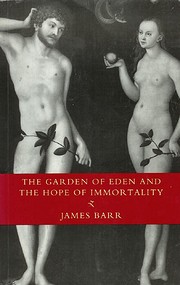

Auf ein Miniaturbild klicken, um zu Google Books zu gelangen.
|
Lädt ... The Garden of Eden and the Hope of Immortalityvon James Barr
 Keine aktuelle Diskussion zu diesem Buch. Keine Rezensionen keine Rezensionen | Rezension hinzufügen
In this book, Professor Barr presents a reading of the story of the Garden of Eden, not as a tale of the origins of sin and death, but as a tale of a chance of immortality, briefly accessible to humanity but quickly lost. Old Testament scholars have long been aware that the traditional reading of the story of Adam and Eve as the 'Fall of Man', though hallowed by St Paul's use of it, cannot stand up to close examination of the text. However, they have not succeeded in formulating an alternative interpretation which rivals the force of this traditional reading or is relevant to such a wide range of biblical and theological issues.Professor Barr's new interpretation has such force, and with its challenges to many conventional views it is likely to cause a considerable stir among traditionalists and to excite those dissatisfied with aspects of traditional thought.Central to the book is its stress on the role and prevalence of the idea of immortality, commonly thought to be a later Greek and un-biblical import into Christian thinking. Reflection on immortality also leads to a reconsideration of ideas about death in the Hebrew Bible; about Sheol. the Hebrew underworld; and about the soul. Professor Barr brings out the importance of time for the Hebrew Bible and the concept of length of days, showing that the threat is not so much death as such, but the manner and time of death. His study of chronology leads to a reconsideration of the story of Noah's ark, and the book ends by seeingresurrection and immortality as complementary, rather than conflicting, ideas. Keine Bibliotheksbeschreibungen gefunden. |
Aktuelle DiskussionenKeine
 Google Books — Lädt ... Google Books — Lädt ...GenresMelvil Decimal System (DDC)236.22Religions Christian doctrinal theology Eschatology; Death; Judgment After Death ImmortalityKlassifikation der Library of Congress [LCC] (USA)BewertungDurchschnitt: (4) (4)
Bist das du?Werde ein LibraryThing-Autor. |
||||||||||||||||||||||||||||||||||||||||||||||||||||||||||||||||||||||||||||||||||||||||||||||||||||||||||||||||||||||||